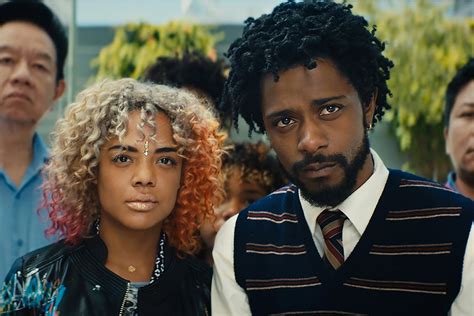4.5 out of 5 stars.
Sorry to bother you, but you really need to see writer/director Boots Riley’s debut feature film. Set in a dystopian version of Oakland, California, the black comedy “Sorry to Bother You” is a rich satire that offers a gold mine of commentary on topics ranging from race to capitalism, drawing the viewer in with a relatable protagonist and opening sequence (Cassius Green is a broke young black man living in his uncle’s garage and desperate for a job) and pulling them in to an increasingly deranged, hilarious, and disturbing story with a twist that no one will see coming.
Cassius (played by Lakeith Stanfield, who you may recognize as the guy who told Daniel Kaluuya to “get out” in “Get Out”) takes a job as a telemarketer at a company called RegalView. The surreal nature of the film is immediately obvious in these early scenes, as Cassius is literally plopped in front of the customers he is calling. He doesn’t have any success at first, prompting his older, and also black, coworker Langston (Danny Glover) to tell him that he needs to use his “white voice”—to talk as if he doesn’t have a care in the world. After adopting this voice (which is provided by David Cross) for work, Cassius becomes unstoppable, and is soon promoted to move to the office upstairs to be a “power caller.” But meanwhile, Cassius’ coworkers go on strike to lobby RegalView to give them raises, and elsewhere in town, a radical group known as the Left Eye is protesting a company called WorryFree, which promises free food and lodging for life in exchange for a lifetime of labor—a practice some see as a new form of slavery.

Riley does a fantastic job building this world, an alternate reality that seems extreme but simultaneously similar to our own. We don’t need a lot of information to figure out what sort of world this is; just that the number one television show in the country is a program in which people are brutally beat up on air, and that WorryFree’s policies are considered legal and largely normal. But to someone like Cassius, who at the beginning of the film can just barely make ends meet, and who also has to contend with the additional struggles brought on by being black in America, that sort of life may be appealing. It is only by pretending to be white, and pretending to be a shell of a person, that he is able to improve his way of living. Even his artist girlfriend Detroit (Tessa Thompson), who criticizes his use of the white voice, adopts a different voice when talking to potential buyers at her gallery show.
Also underscoring the story is the superficiality and lack of compassion that people have. RegalView is all about making the sale. As Cassius’ bosses tell him when he is hired, “stick to the script”—no matter what. WorryFree doesn’t care about its employees, so long as they are as productive as they can possibly be. Detroit has a show inviting strangers to throw things at her (and they do) and when Cassius is invited to meet with CEO Steve Life (Armie Hammer), he is viewed by him and by the other white people at his party as a curiosity and a stereotype.

Riley’s script and direction is sharp, thought-provoking, utterly original, and funny; sometimes funny in a laugh out loud sort of way, and sometimes funny in a “I can’t believe I’m laughing at this” kind of way. The film does become almost a little too crazy for its own good toward the end, however, with the insanity taking away from the clarity of the film’s message, and becoming harder to watch than Cassius’ wild rise to the top. But the excellent cast does keep it grounded to an extent, with Stanfield delivering a star-making performance and Thompson cementing her status as one of today’s fiercest and most talented leading ladies. Hammer is (almost too) perfectly cast as Lift, with Omari Hardwick playing the mysterious power caller who pushes Cassius to keep rising through the ranks. Jermaine Fowler steals some scenes as Cassius’ friend Salvador, while Steve Yeun is the one voice of reason as Squeeze, the one who organizes the telemarketers’ strike.
There’s nothing out there that’s quite like “Sorry to Bother You,” and whether or not it’s your cup of tea, there’s a lot to glean from what it presents, enough to likely require multiple viewings and a lot of thought. Boots Riley is a fresh and interesting new voice in the film world, and we ought to listen up.
Runtime: 105 minutes. Rated R.
I haven’t heard of this film or have any familiarity with it until I read your review. It sounds very interesting. I will plan to see it. Thanks, JC
LikeLiked by 1 person